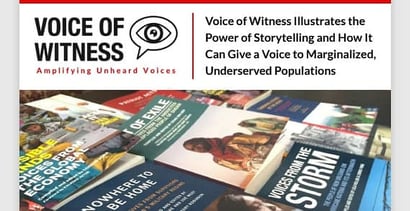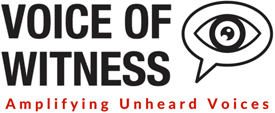

In a Nutshell: With diminishing resources going toward reliable reporting on human rights violations, injustice, and oppression, there is a growing need for stories told directly by those who suffer these abuses. Voice of Witness is a nonprofit organization devoted to sharing the stories of people impacted by injustice around the world. Founded in 2005, the organization began with a series of books telling the oral history of those suffering injustice and has expanded to develop educational programs that teach empathy-based and ethically driven storytelling for marginalized communities. Resources are available free of charge for educators and community activists, policy makers, legislators, and advocates for social justice.
By and large, Americans are kind and compassionate people who care about the plight of others around the world.
In fact, according to the Organization for Economic Cooperation and Development, are the most generous people in the world when it comes to voluntary charitable giving. However, when it comes to awareness and understanding of the challenges faced by the world’s neediest populations, Americans fall somewhere near the bottom of the pack.
Most Americans — if they follow current events at all — get their information in rapid soundbites from network news programs or from social media feeds. The headlines and 30-second snippets most people half listen to are what comprise the majority of their understanding of world events. But, if all we know of the suffering regularly faced by millions of people in the world comes from these narrowly focused sources, then we’re missing the real story.
The struggle for survival that occurs daily among many of the world’s disadvantaged is the story of individuals, families, and communities, not just statistics and numbers. Whether in remote areas of the world or in the underserved communities in our own backyard, the stories are there if people would only choose to listen.
Voice of Witness is a nonprofit organization dedicated to sharing the stories of people impacted by poverty, injustice, displacement, and persecution around the world. Beginning with a single book in 2005 entitled Surviving Justice: America’s Wrongfully Convicted and Exonerated, Dave Eggers, Lola Vollen, and Mimi Lok co-founded Voice of Witness to advance human rights through the oral history of those directly impacted.
 Currently numbering 17 books, the Voice of Witness series has told the personal stories of countless individuals and groups ranging from undocumented immigrants to oppressed populations in Burma to marginalized Americans living in Chicago’s public housing projects.
Currently numbering 17 books, the Voice of Witness series has told the personal stories of countless individuals and groups ranging from undocumented immigrants to oppressed populations in Burma to marginalized Americans living in Chicago’s public housing projects.
The stories, which are first-hand accounts told as oral history, seek to give a voice to people whose stories may otherwise go unheard.
Cliff Mayotte is Education Program Director at Voice of Witness, and we recently had the opportunity to talk with him about the organization’s accomplishments.
“Most of the book series is based on the idea that we wanted to create books of oral history that focus on social justice issues and human rights crises, but also stories that were either underrepresented or underreported,” Mayotte said. “It’s not like oral history replaces any other historical narrative, but we feel like the understanding of an issue or event is incomplete without this kind of storytelling and personal narrative.”
In addition to the much-talked-about books, Voice of Witness has an education program that connects educators, students, and social justice advocates with important unheard stories. The program provides these individuals with support and free downloadable curricula to assist educators in conducting their own oral history projects.
The Importance of Oral History, and Why It Matters Today
Throughout the vast expanse of human history, people have told their stories as a way of explaining who they are as a species, race, culture, tribe, and as individuals. It’s only been in the past century or so that people have looked to others for their story and relied on common or shared experiences told through television, radio, and other media sources. The problem is that these stories are seldom fully accurate or complete.
An oral history is a collection of personal stories told by the individuals who have experienced them. This type of storytelling seeks to provide perspectives that are not typically found in the traditional historical sources or recorded documents. The reason it is important to share these oral histories is that it gives readers an opportunity to look at an event or a time from a new perspective.
“The point is to get past the numbers and statistics and to really make a connection and understand that these things that are going on are actually happening to real people,” Mayotte said. “Many of our books have gotten into the hands of advocates and policy makers over the years, and they’ve used the oral histories as leverage. Politicians and legislators know that, without a story to go along with an issue, it’s very hard for people to connect with and really understand its impact.”
Oral history is also important in helping people to decide for themselves what’s really happening in regard to social justice issues, rather than relinquishing that responsibility to others. Given the current atmosphere of media mistrust, true stories from the mouths of those who’ve experienced events are now more important than ever.
Free Lesson Plans Help Educators Teach Tolerance
When Voice of Witness began putting an emphasis on its education program in 2010, the organization focused on creating Common Core-aligned lesson plans to accompany the book series. This allowed educators to begin discussions around the oral history and narratives their students were reading. The lesson plans and curricula that were developed are available to download free of charge to any educator who is interested.
“Our education program follows a couple of different tracks. Certainly, it promotes cultural proficiency, critical thinking, communication skills, and literacy — our program goals,” Mayotte said. “But the other half of our program is encouraging and providing strategies, tools, and instruction for classrooms and communities to amplify their own unheard voices and to conduct their own oral histories.”
In addition, guides and resource materials are available for educators who wish to introduce their students to the concept of oral history. One such resource is The Power of the Story: The Voice of Witness Teacher’s Guide to Oral History, compiled and edited by Mayotte himself.
Other resources include a Voice of Witness Oral History webinar series, downloadable lesson plans for each of the 17 books in the VOW series, a three-tiered curriculum for educators, and an anthology called The Voice of Witness Reader that’s a great introduction to the series.
“We want to create opportunities for students to really grapple with these human rights and social justice issues through the lens of personal narrative,” Mayotte said. “We want to do everything we can to encourage teachers and students to take history personally.”
Educational Resources for Underserved Communities
Often overlooked in the national discussions of immigration in our country is the story of the immigrants themselves. As Mayotte puts it, “everybody is talking about immigration, but nobody’s talking to immigrants.” One of the most powerful effects of oral history is telling the story of immigrants and displaced people in their own words, Mayotte said.
As part of the group’s efforts in human rights education, Voice of Witness has a special focus on English language learners (ELL) and students from the communities represented in the book series. The Voice of Witness educational resources program supports underserved populations in developing the skills needed to become engaged members of the community.
Voice of Witness education programs serve more than 20,000 people annually, providing curricular support in human rights education and empathy-based learning.
“The people whose stories we tell in the books, we call them narrators rather than interviewees,” Mayotte said. “A lot of these narrators have gone on to become advocates themselves. It’s been a very positive and powerful experience for many of them, to not only feel heard and listened to and believed, but to know that someone else might benefit from your story and experience.”
This may be one of the greatest impacts that Voice of Witness is having — actually changing the lives of people who have been through so much just to reach US borders. When people begin to understand what it means for immigrants and people who have suffered injustice and human rights abuses to find a home in the US, that’s when people know what it means to be American.
Advertiser Disclosure
BadCredit.org is a free online resource that offers valuable content and comparison services to users. To keep this resource 100% free for users, we receive advertising compensation from the financial products listed on this page. Along with key review factors, this compensation may impact how and where products appear on the page (including, for example, the order in which they appear). BadCredit.org does not include listings for all financial products.
Our Editorial Review Policy
Our site is committed to publishing independent, accurate content guided by strict editorial guidelines. Before articles and reviews are published on our site, they undergo a thorough review process performed by a team of independent editors and subject-matter experts to ensure the content’s accuracy, timeliness, and impartiality. Our editorial team is separate and independent of our site’s advertisers, and the opinions they express on our site are their own. To read more about our team members and their editorial backgrounds, please visit our site’s About page.

